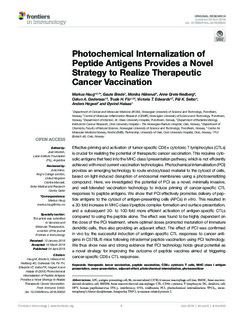| dc.contributor.author | Haug, Markus | |
| dc.contributor.author | Brede, Gaute | |
| dc.contributor.author | Håkerud, Monika | |
| dc.contributor.author | Nedberg, Anne Grete | |
| dc.contributor.author | Gederaas, Odrun Arna | |
| dc.contributor.author | Flo, Trude Helen | |
| dc.contributor.author | Edwards, Victoria Tudor | |
| dc.contributor.author | Selbo, Pål Kristian | |
| dc.contributor.author | Høgset, Anders | |
| dc.contributor.author | Halaas, Øyvind | |
| dc.date.accessioned | 2018-04-10T12:12:03Z | |
| dc.date.available | 2018-04-10T12:12:03Z | |
| dc.date.created | 2018-04-09T08:47:57Z | |
| dc.date.issued | 2018 | |
| dc.identifier.issn | 1664-3224 | |
| dc.identifier.uri | http://hdl.handle.net/11250/2493453 | |
| dc.description.abstract | Effective priming and activation of tumor-specific CD8+ cytotoxic T lymphocytes (CTLs) is crucial for realizing the potential of therapeutic cancer vaccination. This requires cytosolic antigens that feed into the MHC class I presentation pathway, which is not efficiently achieved with most current vaccination technologies. Photochemical internalization (PCI) provides an emerging technology to route endocytosed material to the cytosol of cells, based on light-induced disruption of endosomal membranes using a photosensitizing compound. Here we investigated the potential of PCI as a novel, minimally invasive and well-tolerated vaccination technology to induce priming of cancer-specific CTL responses to peptide antigens. We show that PCI effectively promotes delivery of peptide antigens to the cytosol of antigen presenting cells (APCs) in vitro. This resulted in a 30-fold increase in MHC class I/peptide complex formation and surface presentation, and a subsequent 30-100-fold more efficient activation of antigen-specific CTLs compared to using the peptide alone. The effect was found to be highly dependent on the dose of the PCI treatment, where optimal doses promoted maturation of immature dendritic cells, thus also providing an adjuvant effect. The effect of PCI was confirmed in vivo by the successful induction of antigen-specific CTL responses to cancer antigens in C57BL/6 mice following intradermal peptide vaccination using PCI technology. We thus show new and strong evidence that PCI technology holds great potential as a novel strategy for improving the outcome of peptide vaccines aimed at triggering cancer-specific CD8+ CTL responses. | nb_NO |
| dc.language.iso | eng | nb_NO |
| dc.publisher | Frontiers Media | nb_NO |
| dc.rights | Navngivelse 4.0 Internasjonal | * |
| dc.rights.uri | http://creativecommons.org/licenses/by/4.0/deed.no | * |
| dc.title | Photochemical internalization of peptide antigens provides a novel strategy to realize therapeutic cancer vaccination | nb_NO |
| dc.type | Journal article | nb_NO |
| dc.type | Peer reviewed | nb_NO |
| dc.description.version | publishedVersion | nb_NO |
| dc.source.volume | 9 | nb_NO |
| dc.source.journal | Frontiers in Immunology | nb_NO |
| dc.identifier.doi | 10.3389/fimmu.2018.00650 | |
| dc.identifier.cristin | 1578226 | |
| dc.relation.project | Norges forskningsråd: 223255 | nb_NO |
| dc.relation.project | Samarbeidsorganet mellom Helse Midt-Norge og NTNU: 46056834 | nb_NO |
| dc.relation.project | Norges forskningsråd: 235365 | nb_NO |
| dc.description.localcode | © 2018 Haug, Brede, Håkerud, Nedberg, Gederaas, Flo, Edwards, Selbo, Høgset and Halaas. This is an open-access article distributed under the terms of the Creative Commons Attribution License (CC BY). | nb_NO |
| cristin.unitcode | 194,65,15,0 | |
| cristin.unitcode | 194,66,25,0 | |
| cristin.unitname | Institutt for klinisk og molekylær medisin | |
| cristin.unitname | Institutt for kjemi | |
| cristin.ispublished | true | |
| cristin.fulltext | original | |
| cristin.fulltext | preprint | |
| cristin.fulltext | postprint | |
| cristin.qualitycode | 1 | |

